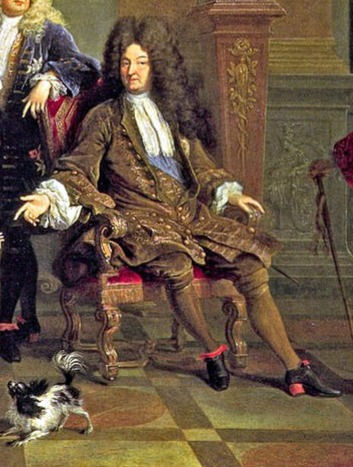This text comes from our book, Light to the Nations I: The History of Christian Civilization.

On September 1, 1715, King Louis XIV of France died. With his passing, the “Great Century” (the age of Louis XIV) came to an end. During that monarch’s reign, France became not only the most powerful nation in Europe but the undisputed leader of European culture. Throughout Europe, aristocrats took on French ways and spoke the French language. They built houses and public buildings in the French style, and the artists and writers they patronized imitated the patterns of French art and literature. Louis XIV may have been the most feared ruler in Europe, but he was also the most envied and imitated.
Louis XIV gave Europe the example of a successful absolute monarch. Believing as he did in the divine right of kings, he tried to bring every French institution under the control of the crown – including the Catholic Church in France. In Louis’s mind, the Church had to do the king’s bidding. Yet, even though Louis used the Church in France to advance his political goals, he was a true believer in the truths of the Catholic Faith. He fought against heresy in his dominions, using a police force and the courts to crush opposition to the Church. Authors of heretical books, and even the readers of these books, could be imprisoned or condemned to serve in the galleys. In his personal life, Louis XIV attended to his devotions and even heard daily Mass as often as he could.
But Louis XIV was a contradictory character. Though devout, he appointed unfit men to serve as bishops in the French Church, and he himself lived an immoral life. And while he actively suppressed heresy and the spreading of anti-Catholic ideas in his kingdom, many of the nobles of his court were skeptics and moral libertines.

Not much changed under Louis XIV’s successor, King Louis XV. Like his grandfather, the new king suppressed bad books and punished dissenters against the Church. Yet, despite these measures, anti-Catholic books continued to be published in France and were even promoted by government officials. Members of the nobility avidly read these books, while elegant ladies formed salons where Liberal and irreligious ideas were openly and enthusiastically discussed. Paris itself had Liberal discussion clubs, and societies in the provincial French towns offered lectures on the new ideas.
The Paris salons drew more than just aristocrats. Middle class intellectuals who promoted Liberalism found their way into these gatherings, where they earned the friendship and support of the aristocracy. With the support of the ruling classes, these thinkers, called philosophes (or philosophers), spread irreligion and Liberalism into the middle class.
Among the Parisian philosophes was a notary’s son who, by wit and cunning, became the age’s greatest popularizer of Liberal thought, not only in France, but across Europe and even into Europe’s American colonies. His name was François Marie Arouet, but he came to be known more commonly by his pen name – Voltaire.
A Jewel from the Crown of Louis XIV
François Couperin was among the greatest of French composers and served as a musician in the court of Louis XIV. What follows is one of his Concerts Royaux, performed by Jordi Savall and his ensemble, Hesperion XXI.
コメント